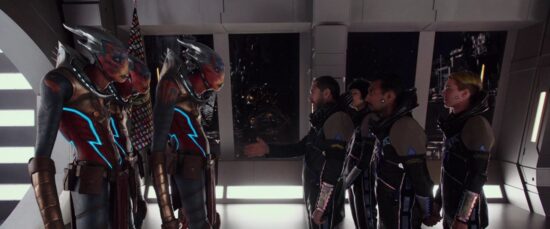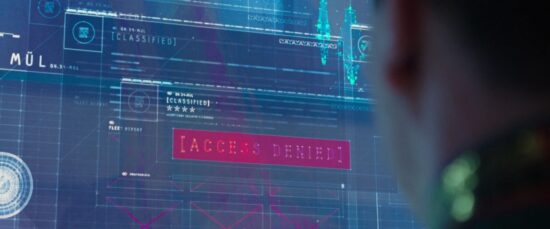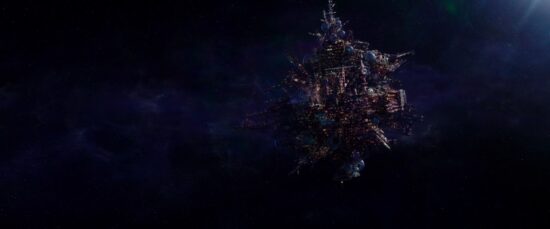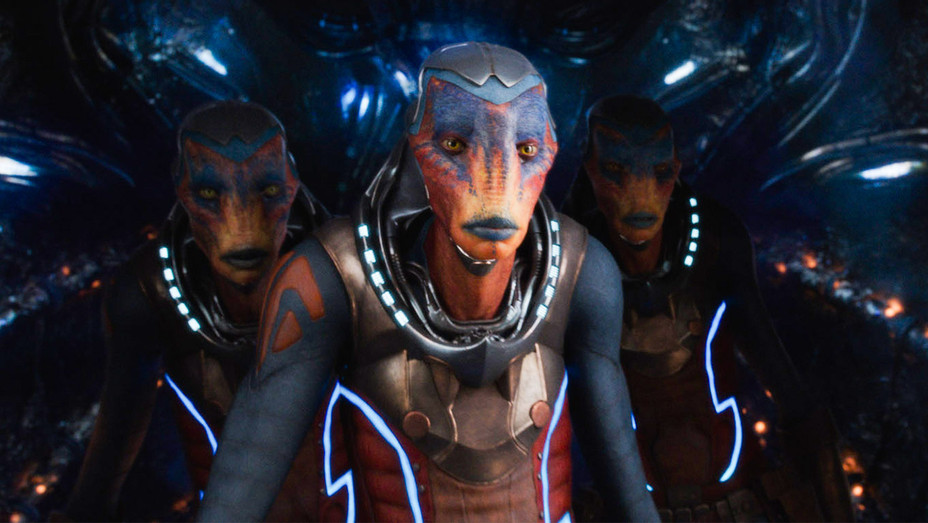Imagine a giant city floating in space, built not by one species, but a thousand; not as part of a master project planned this way from the outset, but evolving over time to accommodate the needs, desires and cultures of disparate worlds; always in close quarters, always disseminating knowledge throughout a bricolage of cosmic society.
Perhaps director Luc Besson’s most popular Sci-Fi film is and will always be The Fifth Element (1997). It’s true he even wrote early drafts of the script as a bored schoolboy, and so it’s safe to assume no passion was lacking when its production began. However, the French comic Valérian and Laureline, created by Pierre Christin and Jean-Claude Mézières in the late 1960s, has arguably been a source of inspiration for Besson for even longer, and posits from the outset a refreshing take on the constitution of society in the distant future.

The opening sequence of Valerian and The City of a Thousand Planets (2017) wears its heart on its sleeve. Set to David Bowie’s “Space Oddity,” a silent montage begins with the United States’ Apollo module connecting with the Soviet Soyuz spacecraft in 1975. As the date rolls forward into the future, we’re shown imagined shuttles from other nations reaching the space station, their crews offering diverse but friendly greetings specific to their culture, growing more and more novel as the date rolls towards a new millennium and alien ships begin to arrive from other worlds. The rich, colourful visuals show each visiting spacecraft connecting to the existing structure, further enriching the city with new resources and knowledge. A thousand years from now, a thousand species join this society of outliers, choosing to become part of the community: not just surviving, but thriving.
Progress gradually slows until the space station has reached critical mass, its weight and size now posing a serious threat to Earth, meaning it must be released from the gravity of the planet where the project began. The Alpha station is gently thrusted to safety, further into space, and set on a cosmic current to explore the outer reaches of the galaxy. Besson’s ambition is clear here: this is not an industrial operation, but a philosophical one. This shift out of the Earth’s orbit comes with a message to whoever should discover the space station next: ‘[Alpha is] a symbol of our values and knowledge: it will carry a message of peace and unity to the farthest reaches of the universe.’

Over four hundred years pass until we meet the protagonists of the film, Valerian (Dane DeHaan) and Laureline (Cara Delevingne), agents of a galactic government that shows itself to be the real antagonist, despite its own arguments to the contrary. Interestingly enough, it is not the sexual tension or desire to enjoy the larger-than-life exploits of the two agents that sustains the emotional core of this film, but Besson’s optimistic stance on society in the far-future, despite the machinations of selfish government officials. The ethics of Alpha and its openness to revision, modulation and difference really stand as a critique of our current socio-economic system and its own allegiances to power. These issues are addressed by Besson’s writing, direction and stylistic details, taken straight from the source material first released in France in 1967, a year before the civil unrest of May ‘68.
Despite the revolutionary tone of the late ’60s, the 1970s ushered in a new economic and political model in America and the UK based on individualism rather than the agency of social groups, an ideology that has now impacted the entire globe. This model is known as Neoliberalism, a phenomenon tackled extensively by writer, cultural theorist, philosopher and critic, the late Mark Fisher (1968 – 2017). Fisher’s life and work (running alongside Besson’s chronologically), culminated in a commitment to promoting alternate futures as an antidote to Neoliberalism and its maladies. Capitalist Realism is Fisher’s term for the feeling, present in the lives of many people today, that the capitalist system is the natural and necessary mode of life on earth: its success down to its invisibility, the lack of open access to its structural integrity, and access to alternatives.
Although this is not explicitly stated in Valerian, the consequences of this deception are explored as the narrative progresses, away from the action-adventure of Valerian and Laureline’s early missions, to the cause of toxic metastases in the heart of Alpha, supposedly threatening the whole city. As the military wing of the space station’s government depict this zone as one of hostile chemical imbalance and threat, the protagonists are sent from one place to another without an understanding of the broader picture.
Access to information about the “threat” is denied to all but the highest-ranking Generals, an impenetrable firewall encountered by more and more characters the closer we come to the film’s denouement. With each impasse, we, the viewer, keenly sense something is blocking access to the future of Alpha in the same way we might feel something is blocking the potential futures of our daily lives, be it the nature of our work, the price of houses, or limited freedoms when it comes to travel. Access to knowledge enables movement, and science fiction is just one way empathy can be sustained between us and those marginalised in this process. Like the ACCESS DENIED warning on Alpha’s control panel, barriers both material and existential have been erected to divide us, reducing our capacity to acknowledge different tiers of interaction between modes of being that come from a different place than our own. What plays out in Alpha’s microcosm of society is writ large in the world around us.

Fisher’s academic work argues that once access to information is denied to all but the agents of Power, sites of negotiation are reduced, limiting our capacity to think creatively and empathically. For instance, how many newspaper editors are dizzy with the utopian possibilities of learning from the culture of immigrants? How many talk show hosts invite creative discussion about imagined futures based on anything but economic benefits to their own nation? If we follow Fisher and Besson, all of this could be imagined differently.
The hurdle the film’s characters must overcome is the erosion of community and the new violence of division. As the General’s plot is exposed by Valerian and Laureline, it’s clear how his control of the transference of knowledge has catalysed a toxic sense of inside and outside, or what is known as a binary opposition. As in today’s global politics, this scenario is established and maintained by naturalised formations of power on the left and right, the pre-given poles that obscure access to a more rhizomatic politics of flux. Such divisions stem from a history of class relations, but our consciousness of this class-based history is lost once disparate groups are pitted against one another without context. Some of us cling to identities indexed to the extreme left or right, with many others left floating in a vacuum of sadness, despondency and resignation somewhere in the middle (see Children of Men, 2006, or WALL-E, 2008). In either case whenever we dig deeper we meet our own firewalls, installed to mystify the hierarchies of power brought to light in this film.
The magic of Mark Fisher and Luc Besson alike is that they have used a disappointment with the present to direct energy into new futures. Such novel conceptions of what society could be can feel like an outstretched arm to those of us floating in space between political ideals we can’t abide, an invitation to think beyond the firewall of the status quo.
At the heart of Valerian is a yearning for a future that has not yet arrived, a hauntology, in Fisher’s words. But such a future – vibrant, messy and interconnected – is all the more likely because this film exists, despite any cinematic failures or oversights critics may attribute to it. Like the comics Besson fell in love with as a child, Valerian keeps the candle of class consciousness burning in its own way, lighting one possible path to a future that, to quote the film, carries ‘a message of peace and unity to the farthest reaches of the universe’.

